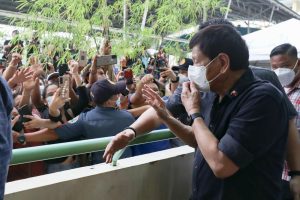The Philippine government has repeated that it will not cooperate with the international investigation into the violent anti-drug campaign launched by former President Rodrigo Duterte.
The announcement from Justice Secretary Jesus Crispin Remulla came after a panel of judges at the International Criminal Court (ICC) in The Hague authorized the Office of the Prosecutor to resume its investigation into alleged crimes against humanity in the Philippines.
“They are insulting us,” Remulla told reporters on Friday, describing the case as “totally unacceptable.” “I do not welcome this move of the ICC and I will not welcome them to the Philippines until they make clear that they will respect us in this regard.”
Duterte’s “war on drugs” campaign, a signature policy that began the moment that he was sworn into office in mid-2016, has claimed thousands of lives, by the government’s account; some human rights groups put the death toll as high as 12,000. In September 2021, judges at The Hague-based ICC authorized an investigation into the anti-drug campaign, describing it as a “widespread and systematic attack against the civilian population.”
The ICC’s investigation has been paused since November 2021, when the Philippine government requested a deferral under the principle of complementarity, under which ICC investigations can only proceed in the absence of local investigations. Manila claims that it has opened its own probes into cases of extrajudicial killings attributed to the police during “drug war” operations.
In a statement announcing the reopening of the investigation, the ICC said that it was “not satisfied that the Philippines is undertaking relevant investigations that would warrant a deferral of the investigation” and that “the various domestic initiatives and proceedings, assessed collectively, do not amount to tangible, concrete and progressive investigative steps in a way that would sufficiently mirror the Court’s investigation.”
Former ICC chief prosecutor Fatou Bensouda said in late 2020 that a preliminary probe had found “a reasonable basis to believe that the crime against humanity of murder has been committed on the territory of the Philippines” between July 1, 2016, when Duterte came to office, and March 16, 2019, when Duterte withdrew the Philippines from the ICC. The ICC investigation also covers alleged crimes committed from November 2011 to June 2016, when large numbers of extrajudicial killings occurred in Davao City while Duterte was mayor.
On Friday, Remulla said the ICC’s timing of the move was “very wrong” since the country is “doing what it takes to fix the system.”
“We are a fully functioning judicial system and I don’t see where they will come in, what role they will play, unless they want to take over our legal system or they want to take over our country,” he said. “I don’t see that happening.”
The ICC’s decision was broadly welcomed by human rights groups and by relatives of drug war victims, who have called in vain for the new administration of President Ferdinand Marcos Jr. to pursue accountability for the sanguinary campaign. “The ICC investigation in the Philippines is the only credible avenue for justice for the victims and their families of former President Rodrigo Duterte’s murderous ‘war on drugs,’” Phil Robertson of the advocacy group Human Rights Watch said in an emailed statement on Friday. “The ICC offers a path forward to fill the accountability vacuum.”
A path forward, yes – though the absence of cooperation from the Philippine government creates a serious, and perhaps terminal problem for the ICC. Indeed, for the investigation to result in indictments and trials would require a remarkable alignment of political factors which, from the vantage point of the first year of the Marcos administration, seem highly improbable.
































